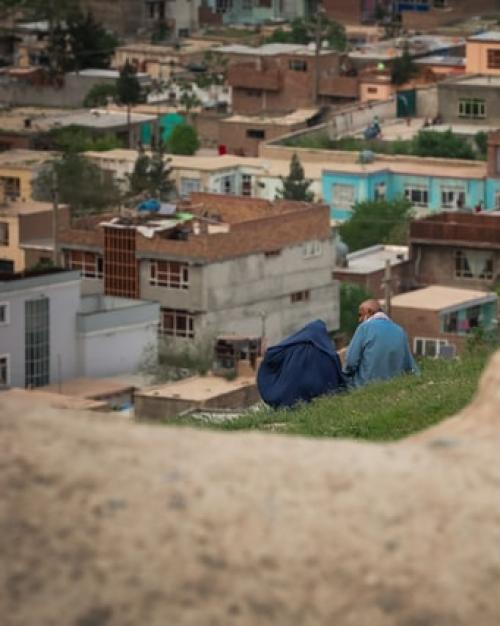As the United States’ withdrawal from Afghanistan unfolded, events sponsored by the Mario Einaudi Center for International Studies and the Institute of Politics and Global Affairs (IOPGA) kept pace and brought Afghan and congressional national security experts to the campus conversation.
The events anticipate Global Cornell’s work in progress to support the university’s Afghan community and provide opportunities for Afghan scholars and evacuated students to continue their careers and studies at Cornell.
“Afghanistan: From the Inside Out” featured two Afghan scholars reflecting on the state of their country, a perspective rarely heard in Western media. The Sept. 3 event was hosted by the Einaudi Center’s South Asia Program (SAP), which fosters research and learning about countries including Afghanistan.
Muska Dastageer, a lecturer at the American University of Afghanistan in Kabul, fled before the city fell. Speaking about her experiences for the first time in public, she described a “deep tiredness of mind.”
“You know you are in the pulse of history,” Dastageer said, “but you spend most of your time trying to not fall apart, to be who you were before these cataclysmic changes.”
Haroun Rahimi, assistant professor of law at the American University of Afghanistan, joined the panel, moderated by Mostafa Minawi, director of Critical Ottoman and Post-Ottoman Studies at the Einaudi Center and associate professor of history in the College of Arts and Sciences (A&S).
Rahimi’s research suggests limited support for Taliban ideology. “The Taliban were not popular, but they did not have to be to obtain their objectives,” he said.
“After Afghanistan: American Foreign Policy after 20 Years of War,” a hybrid event on Sept. 9 hosted by IOPGA in New York City, brought together U.S. Rep. Jim Himes, D-Connecticut, and former U.S. Rep. Chris Shays, R-Connecticut, to discuss the future of U.S. foreign policy. Sarah Kreps, a core faculty member in Einaudi’s Judith Reppy Institute for Peace and Conflict Studies and professor of government (A&S), moderated the panel.
The speakers agreed that the United States lost significant credibility with allies over the unilateral decision to withdraw, and this strategic failure to act in partnership with NATO allies will color the nation’s future relationships, they said.
“The lasting repercussions will be that the next time we go somewhere on a dangerous mission, people are going to think a lot harder about whether they want to help us out,” Himes said.
American power can be used for good, Himes and Shay said. But in Afghanistan, Iraq, Libya and other conflicts stretching back generations, the U.S. has fallen short of strategic aims when it failed to understand local cultures and contexts.
“When we went into Iraq, when we went into Afghanistan, we were totally clueless to the cultures of those countries,” Shays said. “So humility is needed, and soft power is needed.”
Global Cornell, which includes the Einaudi Center, is continuing its mission of enriching the understanding of global cultures by marshalling support for Afghans in higher education.
Global Cornell is partnering with the Institute of International Education’s Scholar Rescue Fund to provide support for three Afghan scholars in exile and resources for rebuilding their careers. Once identified and relocated to Ithaca, the scholars will find a community in SAP and academic homes in departments across the university aligned with their research interests.
In addition, Cornell is taking steps to host a number of Afghan women, undergraduates from the Asian University for Women in Bangladesh, as short-term research interns.
“What is happening in Afghanistan threatens the academic voices and future of the entire region,” said Wendy Wolford, vice provost for international affairs. “Our ability to make a difference is limited, but the outpouring of concern and support from students, faculty, staff and alumni across Cornell has been really inspiring. It makes me proud to be a part of this university.”
Global Cornell is working to arrange housing and meet other basic needs, including winter clothing, laptops, phones and transportation, for the scholars and students. To contribute to this effort, email global@cornell.edu. Monetary donations can be made via the SAP gift page.
Sheri Englund is senior associate director of communication for Global Cornell.
Read this story in the Cornell Chronicle.




